Unit 2 How often do you exercise? Seciton B(1a-1e)课件(共42张PPT)
文档属性
| 名称 | Unit 2 How often do you exercise? Seciton B(1a-1e)课件(共42张PPT) |  | |
| 格式 | zip | ||
| 文件大小 | 10.4MB | ||
| 资源类型 | 教案 | ||
| 版本资源 | 人教新目标(Go for it)版 | ||
| 科目 | 英语 | ||
| 更新时间 | 2021-09-17 17:59:46 | ||
图片预览


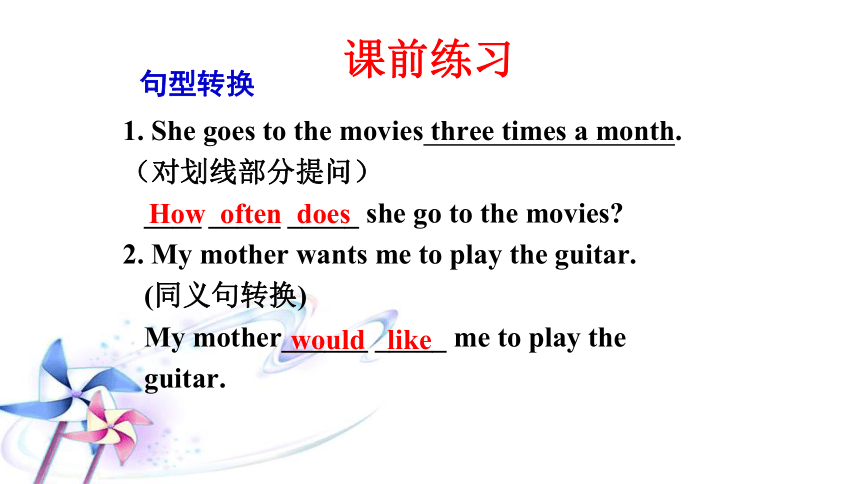
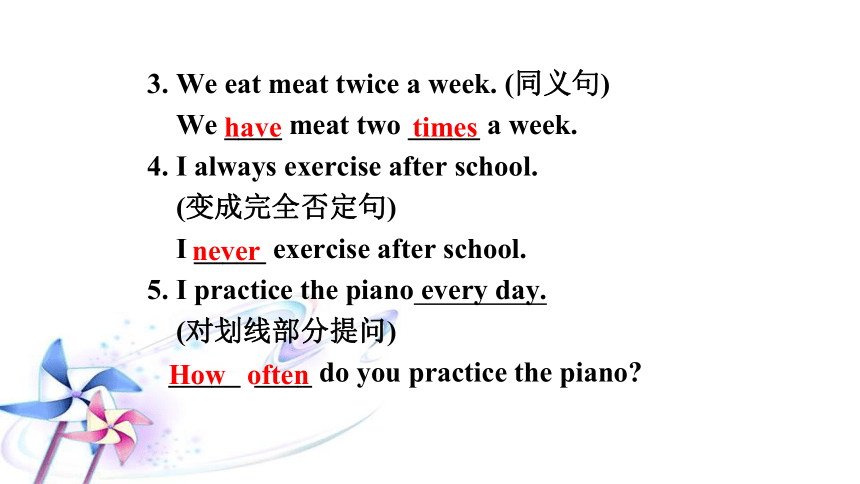
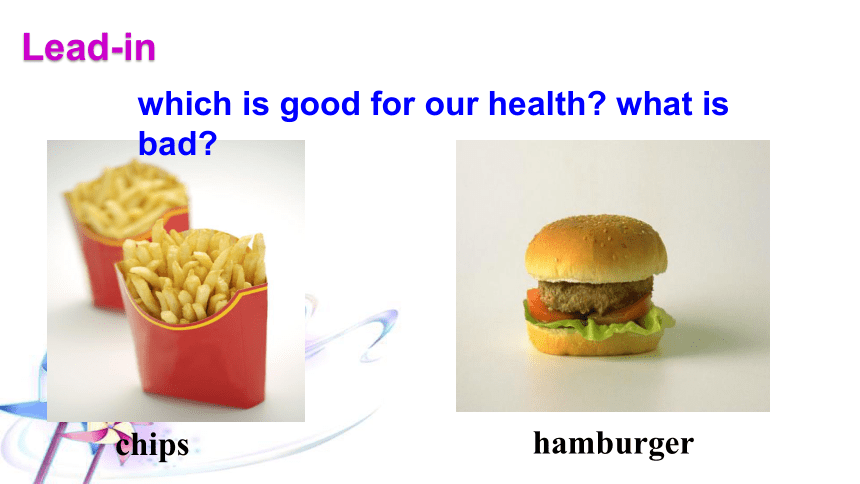
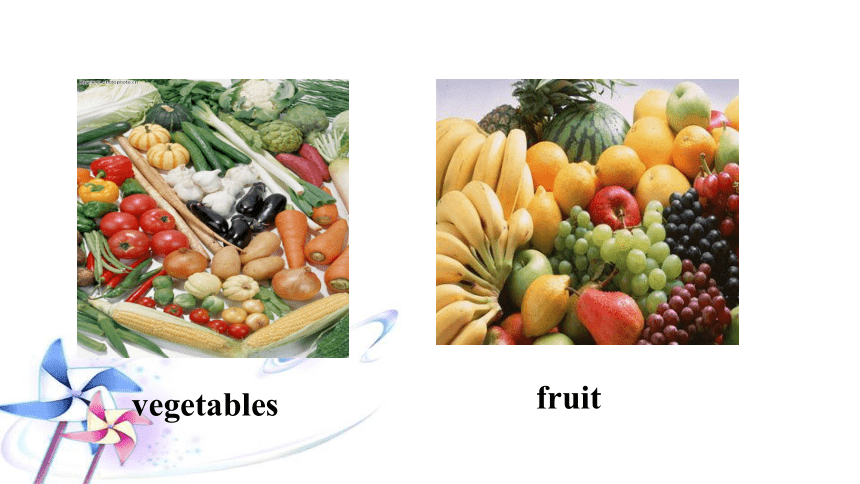
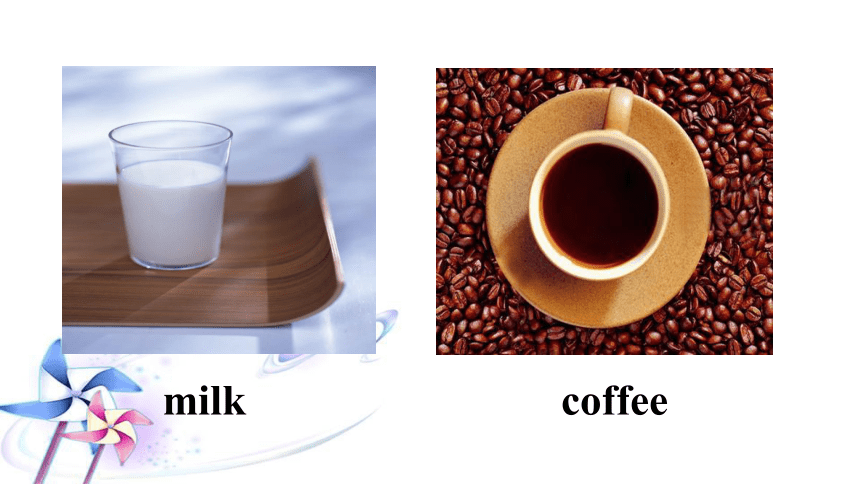
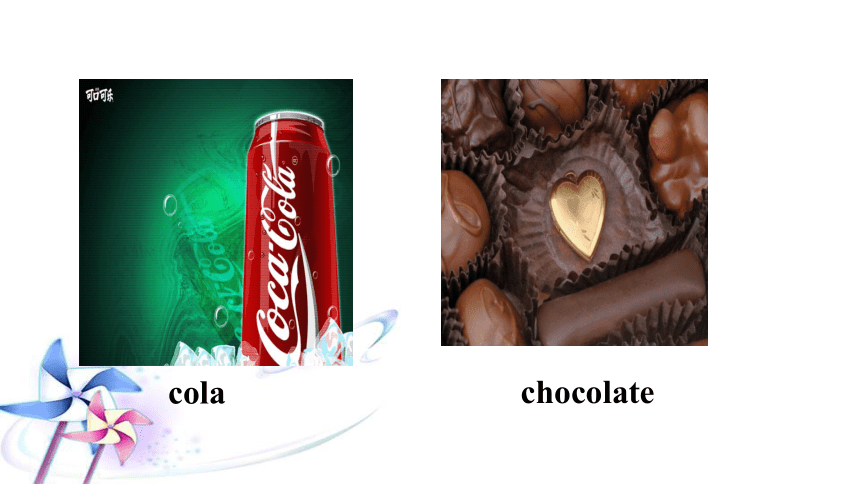

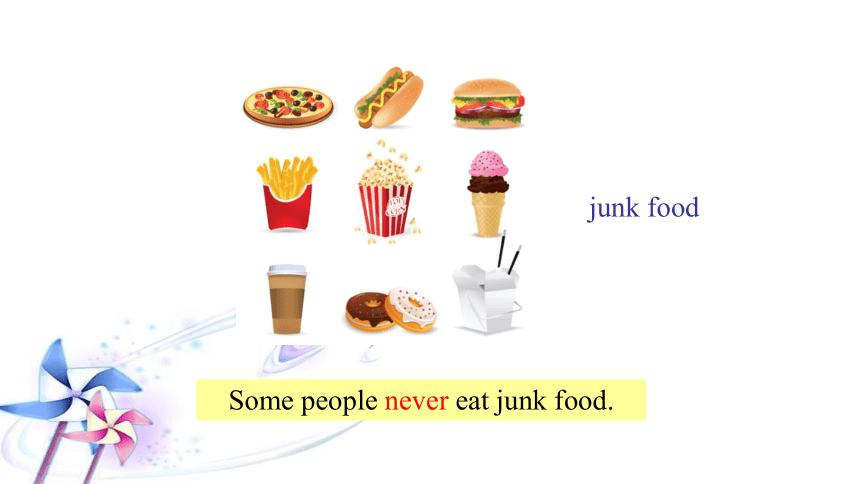
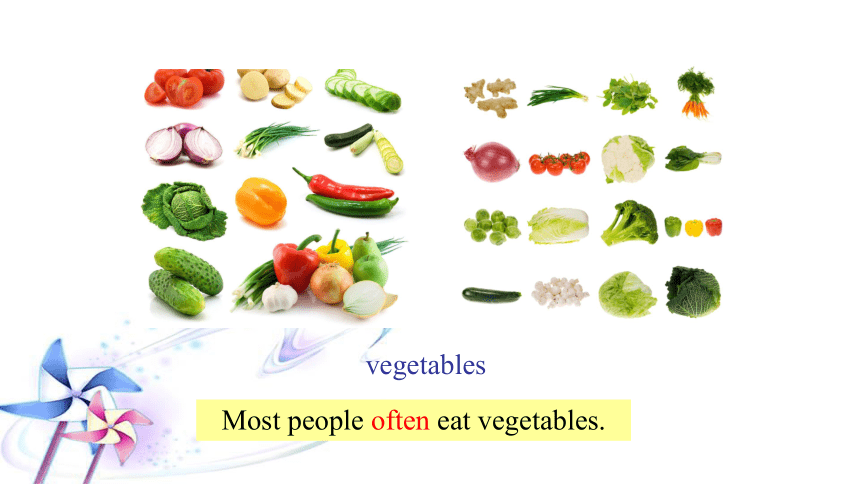
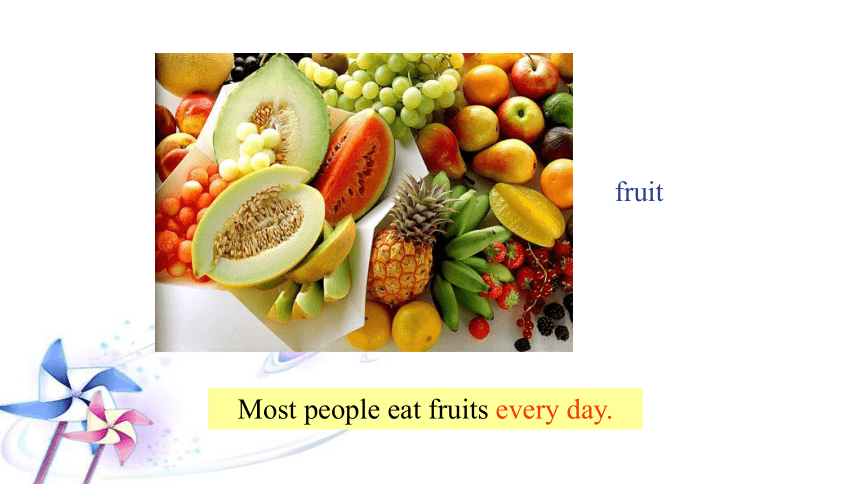
文档简介
(共42张PPT)
Unit
2
Unit
2
How
often
do
you
exercise?
Section
B
1a-1e
句型转换
1.
She
goes
to
the
movies
three
times
a
month.
(对划线部分提问)
____
_____
_____
she
go
to
the
movies?
2.
My
mother
wants
me
to
play
the
guitar.
(同义句转换)
My
mother______
_____
me
to
play
the
guitar.
How
often
does
would
like
课前练习
3.
We
eat
meat
twice
a
week.
(同义句)
We
____
meat
two
_____
a
week.
4.
I
always
exercise
after
school.
(变成完全否定句)
I
_____
exercise
after
school.
5.
I
practice
the
piano
every
day.
(对划线部分提问)
_____
____
do
you
practice
the
piano?
have
times
never
How
often
chips
hamburger
which
is
good
for
our
health?
what
is
bad?
Lead-in
vegetables
fruit
milk
coffee
cola
chocolate
junk
food的说法来自于葡萄牙语。大约500年前,在葡萄牙语里有一个词“junk”,意思是“old
pieces
of
rope(旧缆绳)”。天长日久,这个词的意思逐渐演变为任何可利用的废弃材料。最后,“junk”用来指价值不高或根本没有任何价值的东西。于是,人们就称没有多少营养的食物为“junk
food”。
junk
food
background
junk
food
Some
people
never
eat
junk
food.
vegetables
Most
people
often
eat
vegetables.
fruit
Most
people
eat
fruits
every
day.
coffee
Some
people
drink
coffee
every
day.
sleep
I
sleep
eight
hours
every
night.
How
many
hours
do
you
sleep
every
night?
1a
Match
the
words
with
the
pictures.
a
b
c
d
e
f
____
junk
food
4.
_____
vegetables
2.
_____
milk
5.
_____
sleep
3.
_____
fruit
6.
_____
coffee
b
a
e
c
f
d
healthy:
unhealthy:
cola,
salad,
soup,
hot
dog,
milk,
hamburger,
dumpling,
fruit,
chicken,
onion,
potato,
tomato
healthy:
unhealthy:
salad,
soup,
milk,
dumpling,
onion,
fruit,
chicken,
potato,
tomato
cola,
hot
dog,
hamburger
1b
Ask
and
answer
questions.
Use
the
words
from
1a.
A:
How
often
do
you
drink
milk,
Liu
Fang?
B:
I
drink
milk
every
day.
A:
Do
you
like
it?
B:
No.
But
my
mother
wants
me
to
drink
it.
She
says
it’s
good
for
my
health.
How
often
do
you
eat
junk
food?
I
eat
it
once
a
week.
Do
you
like
it?
Yes.
But
my
mother
doesn’t
let
me
eat
it.
She
says
it’s
bad
for
my
health.
Pair
work
How
often
do
you
drink/eat…?
I
eat
…
Do
you
like
…?
…
Does
Tina
have
good
habits?
Yes.
No.
I
don’t
know.
Does
Bill
have
good
habits?
Yes.
No.
I
don’t
know.
Listen
to
an
interview
about
two
people’s
daily
habits.
Circle
your
answer
to
each
question.
1c
Consolidation
Questions:
1.
How
often
do
you
exercise?
2.
How
often
do
you
eat
fruit?
3.
How
many
hours
do
you
sleep
every
night?
4.
How
often
do
you
drink
milk?
5.
How
often
do
you
eat
junk
food?
6.
How
often
do
you
drink
coffee?
Listen
again.
Fill
in
the
blanks
in
the
survey.
1d
Tina
Bill
_____________
_____________
_____________
_____________
_____________
_____________
_____________
_____________
_____________
_____________
_____________
_____________
every
day
every
day
hardly
ever
nine
every
day
two
or
three
times
a
week
never
never
nine
never
three
or
four
times
a
week
four
times
a
day
Post-listening
1e
Student
A
is
the
reporter.
Student
B
is
Tina
or
Bill.
Ask
and
answer
questions.
Then
change
roles.
A:
How
often
do
you
exercise?
B:
I
exercise
every
day.
A:
And
how
often
do
you
…?
Pairwork
Let's
practice!
1.
How
often
do
you
eat
vegetables?
2.
How
often
do
you
eat
fruit?
3.
How
often
do
you
eat
fast
food?
4.
How
often
do
you
exercise?
5.
How
many
hours
do
you
watch
TV
every
week?
6.
How
many
hours
do
you
usually
sleep
at
night?
Group
work
Name
exercise
fruits
vegetables
milk
junk
food
Jim
every
day
every
day
never
three
times
a
week
twice
a
month
Ask
your
classmates
about
their
daily
habits.
Do
a
survey
Eat
more
fruits
and
vegetables
and
less
junk
food.
Healthy
life
Try
to
exercise
more.
Sleep
eight
or
nine
hours
a
night.
Early
to
bed,
early
to
rise,
makes
a
man
healthy,
wealthy
and
wise.
Saying
Language
points
be
good
for
对……有好处
be
bad
for
对……有坏处
e.g.
Hot
dog
is
bad
for
our
health.
热狗对我们的健康有坏处。
e.g.
Milk
is
good
for
our
health.
牛奶对我们的健康有好处。
1.She
says
it’s
good
for
my
health.
她说它(牛奶)对我的健康有好处。
be
good
for
,
be
good
at与be
good
with
be
good
for:
对……有益,后接名词代词。
be
good
at:
擅长……,后接名词代词或v.-ing形式。
be
good
with:
善于应对……
Doing
morning
exercises
is
good
for
you.
做早操对你有益处。
I’m
good
at
(playing)basketball.
我擅长(打)篮球。
He
is
good
with
children.
他管理孩子有一套。
中考对接
(湖北咸宁中考)—I
think
drinking
milk
every
morning
is
good
____
our
health.?
—
Yes,
I
agree
______
you.?
A.to
;
to
B.
with
;
to
C.
at
;
with
D.
for
;
with
2.
But
my
mother
wants
me
to
drink
it.?
want
sth.
想要某物
want
to
do
sth.
想要做某事
want
sb.
(not)
to
do
sth.
想要某人(不)做某事
e.g.
The
boy
wanted
noting
but
freedom.
Do
you
want
to
go
to
the
movies
with
me?
The
teacher
doesn’t
want
us
to
eat
hamburgers.
3.
She
says
it’s
good
for
my
health.
health
n.
健康;人的身体(或精神)状态
health作不可数名词,常用短语:
be
in
good/poor
health身体好/差。
Smoking
does
harm
to
health.
My
grandma
is
in
good
health.
【拓展延伸】
health
n.
健康
healthy
adj.
健康的
healthily
adv.
健康地
keep
healthy
保持健康
unhealthy
adj.
不健康的
I.
单项选择
1.
I
like
English
very
much,
so
I
____
listen
to
the
tape
in
the
morning.
A.
usually
B.
hardly
ever
C.
never
2.
Milk
is
good
_____
our
______.
A.
to;
healthy
B.
to;
health
C.
for;
healthy
D.
for;
health
A
D
Exercises
3.
—What
does
your
father
do
in
the
evening?
—He
usually
_______.
A.
watch
TV
B.
exercise
C.
reads
books
4.
—
____
students
in
your
class
are
from
Beijing?
—Only
one.
A.
How
often
B.
How
many
C.
How
much
C
B
5.
—
_______
do
you
go
skating?
—
Every
day.
A.
How
often
B.
How
many
C.
When
6.
Most
students
in
my
class
____
exercise
every
day.
A.
does
B.
do
C.
is
doing
D.
are
doing
7.
What
_____
she
____
on
weekends?
A.
is,
do
B.
does,
does
C.
do,
do
D.
does,
do
A
B
D
8.
—______do
your
grandparents
come
to
see
you?
—Twice
a
week.
A.
How
often
B.
How
many
C.
When
9.
He’s
a
very
lazy
student,
as
a
result,
he
always
gets
_______
grades.
A.
a
good
B.
high
C.
terrible
D.
an
awful
A
C
1.
I
sleep
8
hours
every
night.(画线提问)
_____
_____
______
do
you
sleep
every
night?
2.
He
watches
TV
twice
a
week.(画线提问)
_____
_____
_____
he
watch
TV?
3.
Jack
does
his
homework
every
day.
(改为否定句)
Jack
_______
_____
his
homework
every
day.
How
many
hours
How
often
does
doesn’t
do
Ⅲ.
句型转换
4.
He
is
talking
to
his
father.
(用usually改写句子)
He
_______
_____
to
his
father.
5.
My
father
often
reads
newspaper
after
supper.(画线提问)
_____
_____
_____
father
often
____
after
supper?
What
does
your
do
usually
talks
Homework
1.
读1b中的短文。
2.
根据1e的调查结果写一个报告。
Unit
2
Unit
2
How
often
do
you
exercise?
Section
B
1a-1e
句型转换
1.
She
goes
to
the
movies
three
times
a
month.
(对划线部分提问)
____
_____
_____
she
go
to
the
movies?
2.
My
mother
wants
me
to
play
the
guitar.
(同义句转换)
My
mother______
_____
me
to
play
the
guitar.
How
often
does
would
like
课前练习
3.
We
eat
meat
twice
a
week.
(同义句)
We
____
meat
two
_____
a
week.
4.
I
always
exercise
after
school.
(变成完全否定句)
I
_____
exercise
after
school.
5.
I
practice
the
piano
every
day.
(对划线部分提问)
_____
____
do
you
practice
the
piano?
have
times
never
How
often
chips
hamburger
which
is
good
for
our
health?
what
is
bad?
Lead-in
vegetables
fruit
milk
coffee
cola
chocolate
junk
food的说法来自于葡萄牙语。大约500年前,在葡萄牙语里有一个词“junk”,意思是“old
pieces
of
rope(旧缆绳)”。天长日久,这个词的意思逐渐演变为任何可利用的废弃材料。最后,“junk”用来指价值不高或根本没有任何价值的东西。于是,人们就称没有多少营养的食物为“junk
food”。
junk
food
background
junk
food
Some
people
never
eat
junk
food.
vegetables
Most
people
often
eat
vegetables.
fruit
Most
people
eat
fruits
every
day.
coffee
Some
people
drink
coffee
every
day.
sleep
I
sleep
eight
hours
every
night.
How
many
hours
do
you
sleep
every
night?
1a
Match
the
words
with
the
pictures.
a
b
c
d
e
f
____
junk
food
4.
_____
vegetables
2.
_____
milk
5.
_____
sleep
3.
_____
fruit
6.
_____
coffee
b
a
e
c
f
d
healthy:
unhealthy:
cola,
salad,
soup,
hot
dog,
milk,
hamburger,
dumpling,
fruit,
chicken,
onion,
potato,
tomato
healthy:
unhealthy:
salad,
soup,
milk,
dumpling,
onion,
fruit,
chicken,
potato,
tomato
cola,
hot
dog,
hamburger
1b
Ask
and
answer
questions.
Use
the
words
from
1a.
A:
How
often
do
you
drink
milk,
Liu
Fang?
B:
I
drink
milk
every
day.
A:
Do
you
like
it?
B:
No.
But
my
mother
wants
me
to
drink
it.
She
says
it’s
good
for
my
health.
How
often
do
you
eat
junk
food?
I
eat
it
once
a
week.
Do
you
like
it?
Yes.
But
my
mother
doesn’t
let
me
eat
it.
She
says
it’s
bad
for
my
health.
Pair
work
How
often
do
you
drink/eat…?
I
eat
…
Do
you
like
…?
…
Does
Tina
have
good
habits?
Yes.
No.
I
don’t
know.
Does
Bill
have
good
habits?
Yes.
No.
I
don’t
know.
Listen
to
an
interview
about
two
people’s
daily
habits.
Circle
your
answer
to
each
question.
1c
Consolidation
Questions:
1.
How
often
do
you
exercise?
2.
How
often
do
you
eat
fruit?
3.
How
many
hours
do
you
sleep
every
night?
4.
How
often
do
you
drink
milk?
5.
How
often
do
you
eat
junk
food?
6.
How
often
do
you
drink
coffee?
Listen
again.
Fill
in
the
blanks
in
the
survey.
1d
Tina
Bill
_____________
_____________
_____________
_____________
_____________
_____________
_____________
_____________
_____________
_____________
_____________
_____________
every
day
every
day
hardly
ever
nine
every
day
two
or
three
times
a
week
never
never
nine
never
three
or
four
times
a
week
four
times
a
day
Post-listening
1e
Student
A
is
the
reporter.
Student
B
is
Tina
or
Bill.
Ask
and
answer
questions.
Then
change
roles.
A:
How
often
do
you
exercise?
B:
I
exercise
every
day.
A:
And
how
often
do
you
…?
Pairwork
Let's
practice!
1.
How
often
do
you
eat
vegetables?
2.
How
often
do
you
eat
fruit?
3.
How
often
do
you
eat
fast
food?
4.
How
often
do
you
exercise?
5.
How
many
hours
do
you
watch
TV
every
week?
6.
How
many
hours
do
you
usually
sleep
at
night?
Group
work
Name
exercise
fruits
vegetables
milk
junk
food
Jim
every
day
every
day
never
three
times
a
week
twice
a
month
Ask
your
classmates
about
their
daily
habits.
Do
a
survey
Eat
more
fruits
and
vegetables
and
less
junk
food.
Healthy
life
Try
to
exercise
more.
Sleep
eight
or
nine
hours
a
night.
Early
to
bed,
early
to
rise,
makes
a
man
healthy,
wealthy
and
wise.
Saying
Language
points
be
good
for
对……有好处
be
bad
for
对……有坏处
e.g.
Hot
dog
is
bad
for
our
health.
热狗对我们的健康有坏处。
e.g.
Milk
is
good
for
our
health.
牛奶对我们的健康有好处。
1.She
says
it’s
good
for
my
health.
她说它(牛奶)对我的健康有好处。
be
good
for
,
be
good
at与be
good
with
be
good
for:
对……有益,后接名词代词。
be
good
at:
擅长……,后接名词代词或v.-ing形式。
be
good
with:
善于应对……
Doing
morning
exercises
is
good
for
you.
做早操对你有益处。
I’m
good
at
(playing)basketball.
我擅长(打)篮球。
He
is
good
with
children.
他管理孩子有一套。
中考对接
(湖北咸宁中考)—I
think
drinking
milk
every
morning
is
good
____
our
health.?
—
Yes,
I
agree
______
you.?
A.to
;
to
B.
with
;
to
C.
at
;
with
D.
for
;
with
2.
But
my
mother
wants
me
to
drink
it.?
want
sth.
想要某物
want
to
do
sth.
想要做某事
want
sb.
(not)
to
do
sth.
想要某人(不)做某事
e.g.
The
boy
wanted
noting
but
freedom.
Do
you
want
to
go
to
the
movies
with
me?
The
teacher
doesn’t
want
us
to
eat
hamburgers.
3.
She
says
it’s
good
for
my
health.
health
n.
健康;人的身体(或精神)状态
health作不可数名词,常用短语:
be
in
good/poor
health身体好/差。
Smoking
does
harm
to
health.
My
grandma
is
in
good
health.
【拓展延伸】
health
n.
健康
healthy
adj.
健康的
healthily
adv.
健康地
keep
healthy
保持健康
unhealthy
adj.
不健康的
I.
单项选择
1.
I
like
English
very
much,
so
I
____
listen
to
the
tape
in
the
morning.
A.
usually
B.
hardly
ever
C.
never
2.
Milk
is
good
_____
our
______.
A.
to;
healthy
B.
to;
health
C.
for;
healthy
D.
for;
health
A
D
Exercises
3.
—What
does
your
father
do
in
the
evening?
—He
usually
_______.
A.
watch
TV
B.
exercise
C.
reads
books
4.
—
____
students
in
your
class
are
from
Beijing?
—Only
one.
A.
How
often
B.
How
many
C.
How
much
C
B
5.
—
_______
do
you
go
skating?
—
Every
day.
A.
How
often
B.
How
many
C.
When
6.
Most
students
in
my
class
____
exercise
every
day.
A.
does
B.
do
C.
is
doing
D.
are
doing
7.
What
_____
she
____
on
weekends?
A.
is,
do
B.
does,
does
C.
do,
do
D.
does,
do
A
B
D
8.
—______do
your
grandparents
come
to
see
you?
—Twice
a
week.
A.
How
often
B.
How
many
C.
When
9.
He’s
a
very
lazy
student,
as
a
result,
he
always
gets
_______
grades.
A.
a
good
B.
high
C.
terrible
D.
an
awful
A
C
1.
I
sleep
8
hours
every
night.(画线提问)
_____
_____
______
do
you
sleep
every
night?
2.
He
watches
TV
twice
a
week.(画线提问)
_____
_____
_____
he
watch
TV?
3.
Jack
does
his
homework
every
day.
(改为否定句)
Jack
_______
_____
his
homework
every
day.
How
many
hours
How
often
does
doesn’t
do
Ⅲ.
句型转换
4.
He
is
talking
to
his
father.
(用usually改写句子)
He
_______
_____
to
his
father.
5.
My
father
often
reads
newspaper
after
supper.(画线提问)
_____
_____
_____
father
often
____
after
supper?
What
does
your
do
usually
talks
Homework
1.
读1b中的短文。
2.
根据1e的调查结果写一个报告。
同课章节目录
- Unit 1 Where did you go on vacation?
- Section A
- Section B
- Unit 2 How often do you exercise?
- Section A
- Section B
- Unit 3 I'm more outgoing than my sister.
- Section A
- Section B
- Unit 4 What's the best movie theater?
- Section A
- Section B
- Unit 5 Do you want to watch a game show?
- Section A
- Section B
- Unit 6 I'm going to study computer science.
- Section A
- Section B
- Unit 7 Will people have robots?
- Section A
- Section B
- Unit 8 How do you make a banana milk shake?
- Section A
- Section B
- Unit 9 Can you come to my party?
- Section A
- Section B
- Unit 10 If you go to the party, you'll have a grea
- Section A
- Section B
